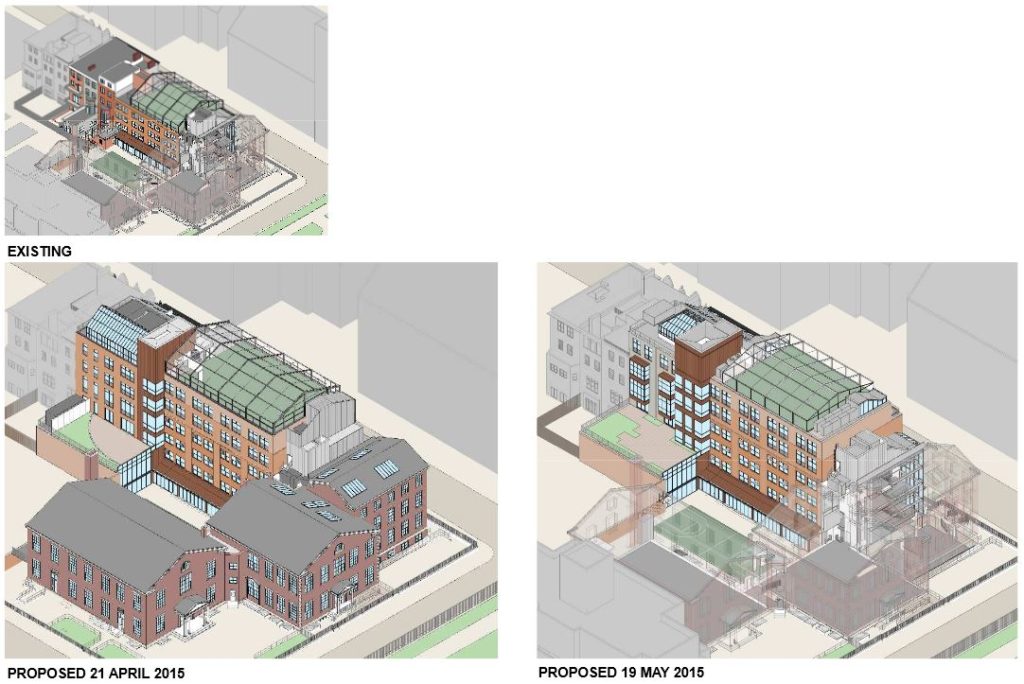Friends Seminary School Lawsuit
and Fraudulent Letters Investigation
Last year, the Friends Seminary School applied to the Landmarks Preservation Commission (LPC) to make significant changes to their historic East 16th Street campus in the Stuyvesant Square Historic District. The application called for a series of large additions on top of both its 19th century townhouses and the 1963-65 Hunter Hall, as well as additions to and a complete gutting of and modernization of the townhouses’ rear façades by Kliment Halsband Architects. HDC gave testimony at the Public Hearing on April 21, 2015, objecting to the visibility of the easternmost rooftop addition, a large mass clad in grey zinc, from Stuyvesant Square, and the destruction of so much historic material in the rear, among other concerns. The Commission took no action at the hearing, asking the applicants to come back with a revised proposal. The commissioners’ comments were that the overall bulk was too visible, and that the applicant should investigate below grade options if possible. They further requested that the stair bulkhead be removed from the roof; that less historic fabric be eliminated from the townhouses; and that the applicants restudy the interior layouts to reduce the bulk of the rear additions; and to further develop areaways at the townhouses.
Photo rendering showing the existing campus (top) and the proposed expansion (bottom)
On a May 19, 2015, Public Meeting (during which the Commission does not take public testimony), the Commission approved a revised proposal of the scheme, stating that the changes sufficiently reflected the commissioners’ requests. The resolution outlining the approval included 19 findings.
Soon after, residents living in the Stuyvesant Square community filed an Article 78 lawsuit against the LPC. A court hearing took place on June 15, 2016, at the end of which Justice Lucy Billings scheduled a trial to determine whether there had been any deliberations by the LPC about the revised proposal and the formulation of the final resolution’s findings before the May 19 Public Meeting. Essentially, Justice Billings questioned how the LPC arrives at its findings; and asked, specifically, if there had been any discussions conducted behind closed doors, which might constitute a violation of the Open Meetings Law.
Rendering showing the existing rear of the campus (top) and the proposed (bottom)
HDC, which reviews every application for a Certificate of Appropriateness permit to the LPC, has long been concerned with how the LPC responds to public testimony and how the agency makes decisions, especially about controversial items like this one. In the lawsuit, the community is questioning whether the applicant addressed the community’s and the Commission’s concerns adequately, asking what the standard is for calling for another Public Hearing (during which public testimony would be heard) for revised proposals. During the June 15th court proceedings, LPC counsel stated that the LPC staff wrote up the findings, which the Commission reviewed and adopted on May 19. However, it appears that Justice Billings is seeking to confirm that no other deliberations took place among the commissioners themselves, with whom the powers of the agency ultimately rest.
HDC hopes that the ultimate outcome of the Article 78 trial about the LPC process will bring more transparency to the LPC’s decision-making process. We will notify you of the trial date and encourage attendance from the public.
Meanwhile, in addition to the civil action, the New York City Department of Investigations (DOI) has confirmed allegations that a Friends School parent coordinated false testimony to the LPC in support of its expansion plans, according to DNAInfo. The DNAInfo article discusses allegations that a real estate developer and producer asked people to write letters to the LPC falsely claiming to be residents of the Stuyvesant Square community. Whether the letters impacted the LPC decision is unknown at this time.
Addressing the investigation, HDC wrote a letter to Mayor Bill de Blasio on April 14, 2016, stating that “HDC expresses its strong support for [the DOI’s] vigilant investigation and hopes that their research might deter others from attempting similar false identifications. HDC feels that the veracity of official claims made during the public hearing process must be properly vetted and strictly enforced in order to avoid undue influence and to promote a clear and accountable public decision-making process.” It is unclear what the repercussions will be, if any, based on the DOI’s investigation of these allegations. HDC will keep you posted.




